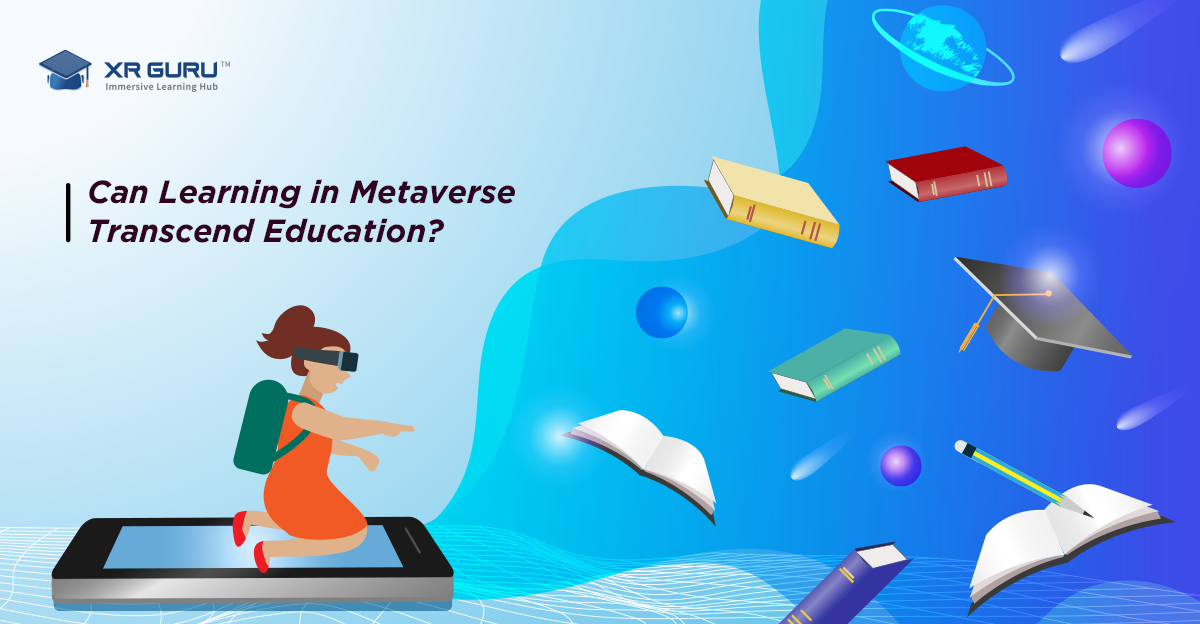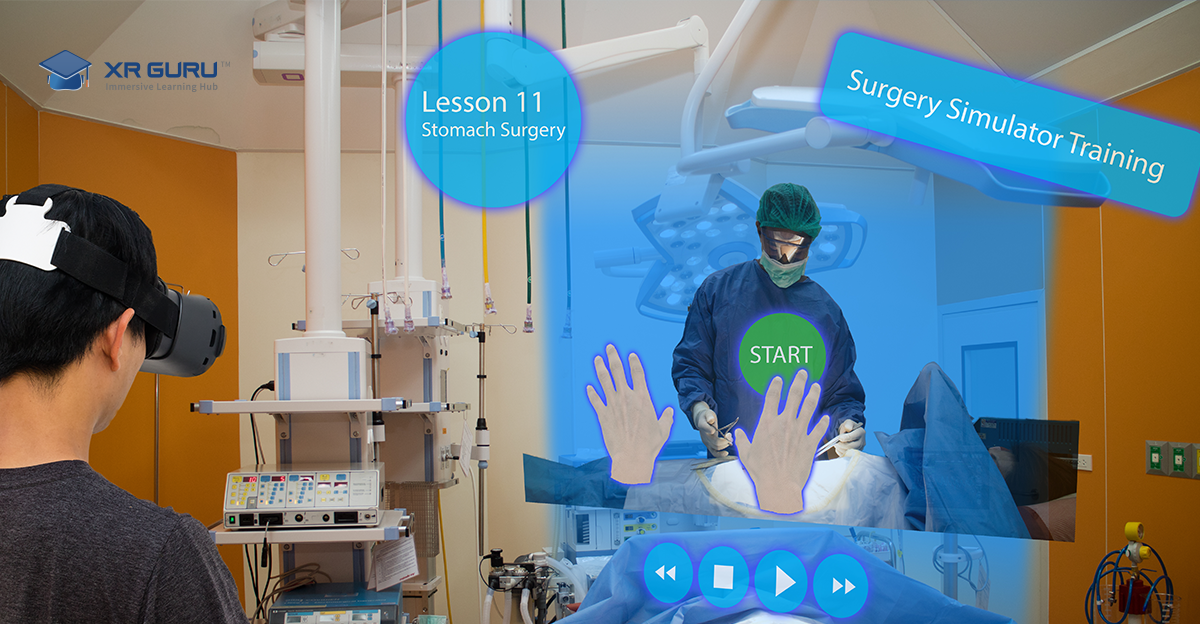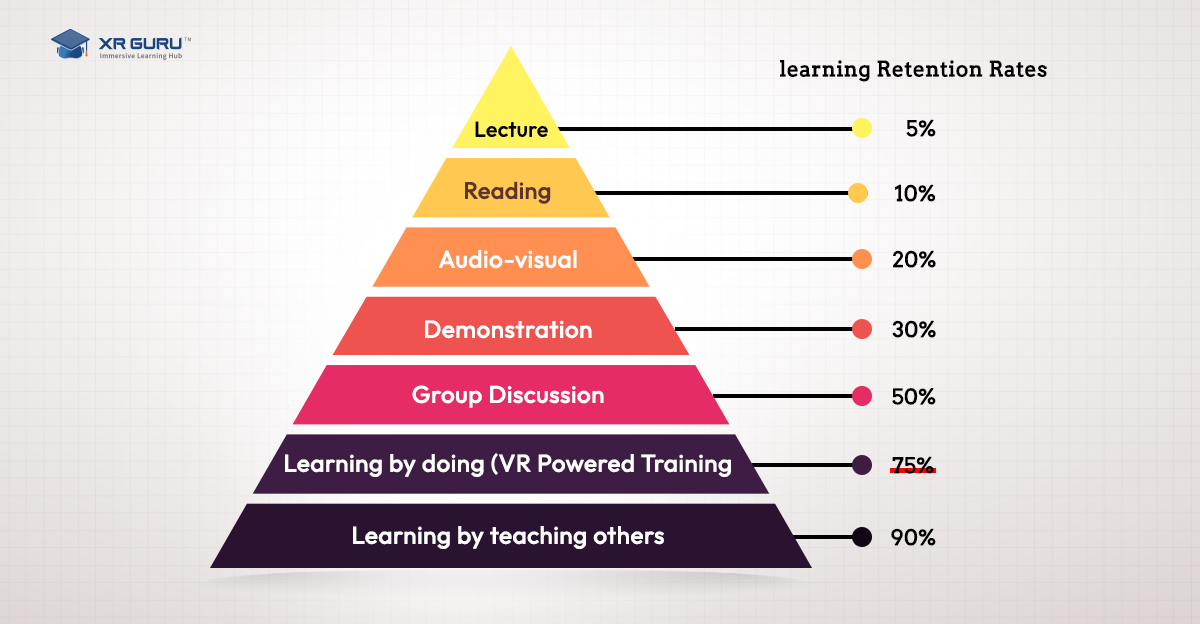
The metaverse is upon us, and it will not be long until it becomes indispensable in our day-to-day lives as YouTube, Twitter, Facebook (Meta), etc. Ever since Facebook rebranded itself as Meta, metaverse has become a trending topic, and there have been a considerable number of discussions around the metaverse.
As technology steps into a new era bringing us incredible immersive worlds, educators must be ready to embrace these new technologies to improve the learning experience. What if your students could "visit" Mars and "explore" the red planet without having to step out of the classroom? Sounds like a dream. Welcome to education in the metaverse.
The potential offered by adopting immersive technologies like AR, VR, MR is immense, and it can revolutionize the way we teach & learn.
Want to know more about education in the metaverse?
On February 28, 2022, XR Guru is conducting a webinar titled " Educate in the metaverse," discussing how education works in the metaverse and the benefits it offers.
Here is an overview of our blog:
- What is metaverse?
- Is metaverse the future of learning?
- How will the metaverse revolutionize education
- Creating Online Classes that Feel Real
- Gamified Learning
- Learning Through Experience
- Drives Student Engagement
- Social Learning
- Fosters Curiosity & Creativity
- Explore new Horizons with VR learning
What is metaverse?
Before we delve deep into education in the metaverse, it is important to know a few basics about the metaverse.
Metaverse is a profoundly scaled network of fully functioning 3D immersive worlds existing beyond the boundaries of the physical world. It is a blend of different elements including VR, AR, MR, gaming, social media, etc. focused on social connection.
In simple terms, a metaverse is a virtual world that mirrors a real-life environment and enables users to do almost everything that they do in real-life such as:
• Connecting with other people


• Interacting with objects
• Play games
• Buy/Sell digital products.
• Share data and resources.
Is metaverse the future of learning?
You may wonder, is metaverse the future, or is it just the latest buzz that will run out of gas after a short while?
Well, worry not. Metaverse is not the latest in the line of gimmicks. In fact, there are stats to back up the claim the metaverse will shape the future of education.
Recent Lenovo survey results disclosed that 54 percent of teachers and 41 percent of parents want an increased presence of virtual reality (VR) and augmented reality (AR) solutions in the classroom.
Another study by IndustryARC predicts the global AR/VR education market to reach $22.4 billion by 2027, growing at a CAGR of 14.6% during 2022-2027.
Based on these stats, it is evident immersive technologies like AR, VR, MR in education are here to stay. As the metaverse is constantly evolving, there is every possibility it will become more refined and immersive than it is today.
Are you excited about learning in the metaverse? Join our webinar session to learn more about education in the metaverse.
How will the metaverse revolutionize education
Now that you have a basic understanding of the metaverse, let us see how schools can use immersive technology in classrooms and how they are beneficial.
1. Creating Online Classes that Feel Real
While online classes have certain advantages over a conventional setup, some students still feel disconnected from others in online classes. Using VR/AR in online education can give an authentic classroom experience. Educators can build virtual classes with lifelike objects with AR/VR. Classrooms in the metaverse allow students to do essentially everything they can do in a real-life classroom.
Further, the metaverse takes online connectivity to a new level with realistic virtual reality avatars. Avatars that mimic a real person can be created & customized, meaning students/teachers can change their outfits, hairstyles, etc. like they do in their day-to-day lives. These realistic avatars add an element of realism to online classes.
2. Gamified Learning
Gamification in education makes learning fun, interactive, and engaging. Gaming elements in lessons bring in an element of competition, making learners actively partake in classroom activities. Teachers can create game-based activities in realistic environments through VR/AR technology to boost student engagement. The competitive nature of games and the challenges and reward points structure motivate students, also the thrill of being the first student to complete a challenge makes learning more intriguing.
3. Learning Through Experience
In traditional educational modes, students’ focus is on understanding concepts by reading rather than experiencing. However, education in the metaverse allows students to "learn by doing" rather than "learn by reading."

The use of virtual and augmented reality technologies creates a safe, low-risk environment in the metaverse for the students to practice. In the metaverse, students can sharpen their skills without worrying about the real-life consequences such as causing harm to property or people. As the metaverse environment is low-risk, students can try out different experiments, learn from their mistakes, and arrive at novel solutions.
For example, this can be extremely useful in healthcare training. Medical students can learn to perform operations, surgeries, etc. in a safe, virtual environment without harming a real-life patient. Further, other students can also learn and practice life-saving techniques such as CPR, and the Heimlich maneuver so they can be of help during a real-life emergency.
4. Drives Student Engagement
Imagine you are teaching students in a traditional classroom setup, and you hear students muttering, "I'm so bored." How would you feel? It sounds like a nightmare scenario, right?
The attention span of students is diminishing by the day, making it challenging for teachers to hold the attention of students throughout the lecture.
What can we do to solve this, you ask?
Incorporating virtual and augmented reality in learning takes student engagement to unprecedented heights. Learning in the metaverse enables students to interact with the subject matter on a closer level and be actively involved in lessons.
For example, instead of teaching them about Roman history in class, you can take them on a "virtual field trip" to ancient Rome and show them Roman architecture and lifestyle.
5. Social Learning
As mentioned before, social interactions and connections are a big part of the metaverse. The metaverse allows learners to see and speak to others in a lifelike environment, creating a sense of community through realistic interactions. Embracing metaverse in education facilitates socializing and playing educational games with fellow learners. Students can create rooms to meet with their study group, and instructors can meet in the metaverse for department meetings and share information.
6. Fosters Curiosity & Creativity
The metaverse offers young minds an opportunity to explore realistic virtual worlds and participate in simulations, instilling curiosity in their minds.
Let's be honest, most students will always prefer participatory learning rather than just reading. Imagine the possibilities if students could 'travel' to space, 'go back in time' to meet the Neanderthals, or study human anatomy in three dimensions. Metaverse can breathe life into learning and plant the seed of curiosity in students, helping them develop critical thinking to arrive at better solutions.
The immersive and experiential nature of the metaverse also makes for a memorable learning experience. In fact, stats show that the retention rates are as high as 75% for experiential learning compared to 5% and 10% for reading and lecture style learning.

Explore new horizons with metaverse
Learning in the metaverse = Better learning experience.
While the metaverse is still in the early stages of development, it has the potential to create immersive experiences that can transform the way we teach and learn.
As developers start to explore the possibilities and test the limits of the metaverse, more innovative, evolved solutions will emerge. Soon it will be easier for students, teachers, and parents to shift into these immersive spaces and get familiarized with the lifelike virtual environment.
As immersive technologies advance, the real question is whether educators, institutions, and investors are ready to tap into the potential of these exciting educational opportunities?
So, are you ready for the metaverse learning experience?
Do you aspire to educate in the metaverse? XR Guru is a next-gen learning application for advancing education and training in the metaverse. XR Guru brings learning to life through immersive experiences, and caters to the needs of institutions, students, parents, and content creators. Choose XR Guru to deliver an engaging educational experience. Contact us for a free consultation on all your virtual reality educational needs.
Join Us for Our Next Webinar
Title: Educate in the metaverse
Gear up for education in the metaverse!
The metaverse is growing quickly, and education is at the center. Many schools are beginning to integrate virtual reality (VR) headsets into schools to begin sharing the metaverse.
Join our live webinar to learn more about how you can engage with the metaverse, and how VR content can help students understand complex topics easily.
Attendance includes a 30-day free trial of all content available through XR Guru so you can explore the VR metaverse on Oculus VR, iPad, Android tablets, and Chromebooks.
If you cannot attend, you can register, and we will send you the recording.
Host: Doug Smith
When and Where:
1:30 p.m. EST, Tuesday, February 28, 2022
25 Minutes
Zoom Link (sent after registration)
Goal: To help educators understand education in the metaverse, create immersive experiences in schools, and illustrate the benefits of learning in the metaverse.
Who Should Join:
• Subject Matter Experts
• Content Creators
• Educators
• Administrators, and
• Those willing to incorporate AR/VR in education.
Highlights of the Webinar:
• Learn what is metaverse
• Learn how education works in the metaverse
• Learn the benefits of adopting AR/VR in classrooms
• View samples of immersive content
• Learn how to access our free Authoring Tool
• View samples of content you can create in our Authoring Tool
Outcome: Attending this webinar can help you understand how embracing the metaverse in education can offer a better learning experience to students.